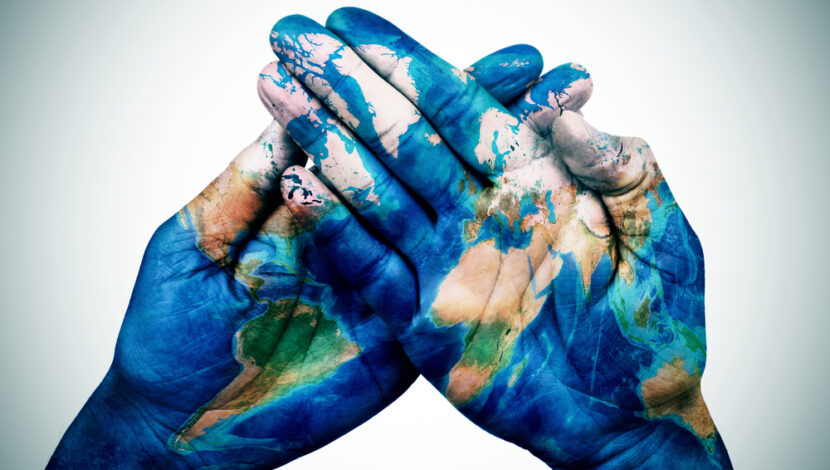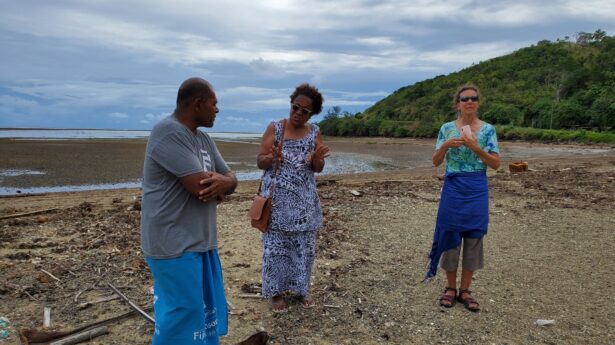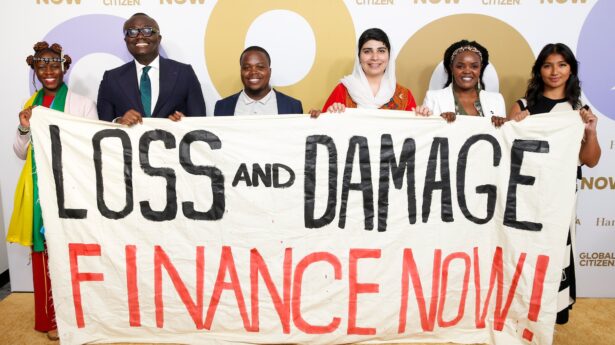The Unitarian Universalist Service Committee advances human rights through grassroots collaborations.
UUSC’s Partners Demand FAIR Goals for Climate Conference

By Mike Givens on November 23, 2023
The 28th Conference of Parties (COP) will take place from November 30 to December 12 in the United Arab Emirates (UAE). The conference is a major annual international gathering bringing together climate justice advocates, activists, policymakers, experts, scientists, and other interested parties to discuss the climate crisis and concrete solutions for change.
The gathering allows nations to join together to brainstorm new ideas for preserving our planet and working collaboratively to achieve sustainable goals for the future. Unfortunately, as with so many other vital international gatherings, COP can also be a space dominated by wealthier nations like the United States and China—smaller nations can often be overshadowed in decision making.
UUSC has consistently worked with communities in smaller nations to address the impacts of the climate crisis and call attention not only to the effects of climate change on these locales, but the international injustice they often face when trying to seek remediation. Smaller nations are often the least likely to contribute to the climate crisis, but disproportionately deal with the impacts—major storms, droughts, rising sea levels, lack of access to clean water, and other life-altering issues.
With these effects come myriad issues for those living in these communities. Displacement, loss of livelihood, the destruction of infrastructure and homes, inadequate access to resources, and many other significant burdens face these communities as they confront the impacts of climate change. For generations, these communities have advocated in international forums for resources to help adapt to the rapid- and slow-onset changes in the environment and tools to support mitigating the impacts of climate change—finding new ways to stave off the effects of climate change in a way that preserves these communities.
And for generations, those pleas have often been ignored. At this year’s COP, those communities have a list of FAIR demands for how they would like major nations like England, France, Canada, the United States, and others to respond to the climate crisis.
Fund Loss and Damage Initiatives
Loss and damage describes the land, languages, cultures, sacred spaces, homes, and more that are lost or severely damaged due to climate change. These losses amount to more than a given community can adapt or respond to and thus threaten the very existence of communities, cultures, and entire countries. Loss and damage is a term that refers to the economic impacts of climate change (loss of homes and public facilities, destruction of roads and bridges, lack of employment or access to traditional lifeways to earn a living), but also the cultural ramifications (massive displacement, loss of language, traditions, and practices due the complete dissipation of communities).
UUSC partner demands are clear: Wealthier nations should pay their fair share into loss and damage funds that help smaller nations recoup losses in the face of climate change.
Assess Progress Towards Climate Success
UUSC partners are demanding that the United States government and other nations participate in the Global Stocktake (GST) process, an “inventory” that each nation undergoes to ensure that it is living up to its international commitments to address climate change. UUSC partners are taking this demand further by suggesting that public input be incorporated into this inventory, allowing members of civil society to provide honest assessments of just how well each of our nations are doing to abide by The Paris Agreement and other international global commitments to mitigate the impacts of climate change.
Increase Funding for Adaptation and Mitigation Activities
According to the European Environment Agency (EEA), adaptation is, “…the process of adjusting to the current and future effects of climate change.” Sustainable adaptation strategies are vital for communities living at the forefront of the climate crisis. For example, if a small agrarian community in Fiji is suddenly faced with consistent droughts, a potential adaptation strategy is setting up a fresh water system to ensure that crops are regularly nourished.
The EEA defines mitigation as, “…making the impacts of climate change less severe by preventing or reducing the emission of greenhouse gases (GHG) into the atmosphere.” Mitigation strategies involve human interventions to ensure that greenhouse gas emissions are controlled and limited, which will then lead to a decrease in global warming. For example, increasing the size of forests, reducing the use of fossil fuels, and driving and flying less in favor of biking and walking, are all examples of mitigation interventions.
UUSC’s partners are resolute in their demands that wealthier nations devote more resources to activities that help communities adapt in place as they experience the effects of the climate crisis and also take sustainable steps to decrease our collective carbon footprint.
Raise Equity and Justice as Pivotal for Adaptation Frameworks
UUSC partners are clear that when supporting communities facing the impacts of climate change, there should be an especial emphasis on supporting groups that are already vulnerable to oppression such as LGBTQ+ people, people with disabilities, women and girls, and seniors. Ensuring that these groups have a voice in decision making spaces around adaptation will be pivotal to ensuring an equitable response to the climate crisis.
UUSC will attend COP with the goal of uplifting our partners, their solutions, and their FAIR demands. Over the course of the two weeks of the convening, we will work alongside our partners to speak truth to power and ensure that those living at the forefront of the climate crisis are heard in the discussions that will ultimately impact their lives—and the lives of us all.
You can have an impact. If you live in the United States, please sign our petition to John Kerry, United States Special Presidential Envoy for Climate, encouraging him to be FAIR in his approach to the climate crisis in the United States and abroad.
Image Credit: Shutterstock—Nito

